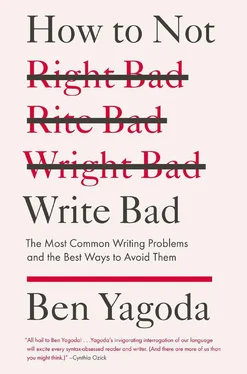Even beyond the fact that the target is moving at warp speed extremely fast, it is impossible to provide a comprehensive list of clichés. First, there are way too many of them. Second, especially on the margins between dead and dying, what’s a cliché to you may not be one to me: it’s an inherently subjective judgment. Third, clichés are field-specific: if you are immersed in the world of sports, or pop music, or business, or higher education, you will be highly sensitized to particular buzzwords and catchphrases that would strike a layperson as unremarkable or unintelligible. And finally, they are register-specific. That is, a cliché in the world of blogs will not be one in the world of scholarly journals, and vice versa.
That being said, here’s a brief list of words and phrases that in my judgment are currently clichés and thus are to be avoided in writing:
That being said
Iconic
Viral
Curate
Deal breaker
Difference maker
The decider
Heavy lifting
High-maintenance
Perfect storm
Brick and mortar
Tsunami
It is what it is
Surreal
The [choose letter of the alphabet]-word
Not so much (as in I like him. Her? Not so much ).
McMansions, McJobs, etc.
[Anything] on steroids
Bucket list
Kerfuffle
Badass
Spoiler alert
The Man (as in working for )
Back in the day
Not your father’s [anything]
Really? (to indicate skepticism)
Artisanal
Plated
House-made
Kick the can down the road
Meme
[anything] 2.0
Man-kini, man-cave, man-date, manorexia, or man-anything else
Get off my lawn!
Now get off my lawn!
5. EUPHEMISM, BUZZWORDS, AND JARGON
These closely related categories resemble clichés in being (as Tom and Ray of the radio show Car Talk like to say) unencumbered by the thought process. Euphemisms are prettifying terms. The classic example is the collection of ever-more-euphemistic words for the place where one goes to relieve oneself , which itself is a euphemism for urinate or defecate. *Thus we say restroom , which is a euphemism for men’s room or ladies’ room , which is a euphemism for bathroom , which is a euphemism for toilet , which is a euphemism for privy , which is a euphemism for…well, this notion is apparently so horrible and unpleasant that we don’t have an actual word for it. I guess that if there were a need to refer to it in writing, I would recommend bathroom as the most straightforward, even though baths are rarely taken there.
The military is famously a fount of euphemism, with such terms as armed intervention (war), neutralize (kill), pacify (kill), collateral damage (unintentionally kill) , friendly fire (unintentionally kill fellow soldiers), and enhanced interrogation (torture). Euphemisms for pregnancy are legion as well. The most recent term I’m aware of originated in Great Britain in the 1990s and has been taken up by American celebrity journalists with a vengeance; it is to refer to a pregnant woman as having a baby bump.
Need I say that, unless you’re being ironic or quoting someone, enhanced interrogation, baby bump , and their ilk should not pass through your fingers?
Jargon — instances of which are sometimes known as buzzwords —differs from euphemism in a couple of ways. It usually originated with members of a particular occupation or group, and it usually fancifies or obfuscates something that doesn’t have an especially negative connotation. Sometimes, it names a thing or phenomenon for which there was no previous word. Sometimes, it means pretty much nothing at all. Jargon is a more egregious problem than euphemism, in my experience; it is strangely enticing and can spread like a virus.
Politics is home to a particular kind of jargon: words and phrases intended to spin a particular issue in a particular direction. People on different sides of the political spectrum express the same concepts in completely different vocabularies! Thus progressives are pro-choice and in favor of investment and increasing revenue. Patriotic Americans, for their part, rail against abortion on demand, tax-and-spend policies , the death tax, and the Democrat Party. (The last is a clever one, in subtly dissociating the party with small- d democratic .) If you’re on one side or the other and trying to stoke the fire on any of these issues, go nuts with the terms I’ve used and the many others like them. However, if your aim is to write in an intelligent, nonpartisan way, avoid them at all costs. Instead, seek words that accurately and temperately convey meaning, such as legalized abortion, government spending, taxes (in general), and the estate tax (in particular).
Prose that comes from business — both advertising and public relations, on the one hand, and internal communication, on the other — contains more jargon than nonjargon. The particular terms in vogue change from time to time. Currently, they include reach out to (contact or get in touch with), going forward (in the future), monetize (make money from), best practices (doing something in a good or efficient way), sustainable (doing something so as not to degrade the environment, which itself is a buzzword that made its way into general diction), grow (transitive verb meaning “develop” or “increase the size of”), give back (make a charitable contribution or conduct a charitable enterprise), bandwidth (personal or organizational capacity), and rightsize (save money by firing people — which takes us back to euphemism).
Between writing that paragraph and this one, I had lunch and read the New York Times , which reported that a radio corporation called Clear Channel Communications had fired several dozen disk jockeys employed by the radio stations it owns around the country. The Times quoted “a company spokeswoman” as saying: “We’ve completely rethought our regional market strategy and reinvented our operations in those markets in a way that will let us compete on a new level — and succeed using all of Clear Channel’s resources, scale and talent.”
That is euphemistic jargon on a very high level indeed. If you work and write for a business, or if you aspire to, you might want to study it, for a mastery of this discourse seems to be essential if you want to rise to the top. I certainly hope the student who wrote the following sentence for one of my journalism classes was interested in a career in public relations or corporate communications, rather than as an actual writer, trying to tell something true to actual readers:
[ The employer relation’s team at Career Services has made a strong effort in trying to facilitate an assertive outreach program toward alumni in order to help build a better partnership with alumni and current students. ]
Actually, that’s probably a bit much even in a business setting. In any case, what he meant to say was:
The employer relations department at Career Services has asked alumni to get in touch with students.
Generally speaking, this kind of nonsense isn’t that hard to avoid. But somewhat more insidious is a collection of terms that originated, I believe, in psychology and other helping professions (itself a prime bit of jargon). The two worst offenders are the verb share (often used as a synonym for say, as in He shared that he was coming home ) and the noun issues used to mean problems or disagreements or some other negative feelings, as in She has issues with her mother. My closing piece of advice in this section — and words to live by in general — is to write, when the facts support it:
Читать дальше












